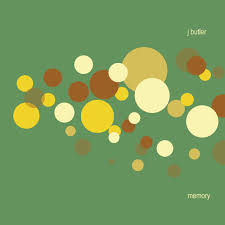Igor Stravinsky famously wrote that contrast satisfies us immediately, but repetition only in the long run. So goes J. Butler’s Memory, a patient exploration of the ways we remember using guitar, loops, and field recordings. The album takes a moment to sink in. Traces of human materiality, of technological mediation shifting in space, coexist with ambient drones that swell and fade. Dynamic soundscapes are full of pleasant eruptions, human and mechanical alike: a fret, a hum, a buzz, a fragment of something past. Subtle oscillations speed up and drift by, like insects. Sounds scratch and catch on corners, scarves stuck on a nail, lingering for a second before riding the breeze. This is summer music, for when you don’t mind the wait.
Memory rewards multiple listens as new layers expand like petals, wings, or hands. Mastered by Seth Chrisman, this is high-fidelity drone music, full of clarities that are meant to be cherished. Butler’s approach to sound resembles the gradually unfolding synthesiser experiments of pioneer Éliane Radigue as much as the static electricity of more recent artists such as Actress and others, who stretch fuzz thin, relishing noise for its own sake. Occasionally, a muddier, lo-fi soundscape settles in, as on the closing track, ‘Ephemera’. The muted foundation there is given direction by a guitar melody punctuated by errant blips and hisses, anomalies in the space that jump out of the bushes and crouch back down, making us wonder if they were put there on purpose.
Intentional or not, all of the sounds intrigue, and the track ‘Billions And Billions’ most of all. It represents memory at its patchiest, a memory consulted long after the fact, belatedly. The sounds, etched here with their sources unclear, are difficult to describe: they are crisp, glitchy, and wrought from something digital, beats uneven and rough around edges that unabashedly show themselves. In other words, this is seriously good.
All six tracks are similarly evocative, even the weakest segment, ‘North’, which offers nothing new. Unlike the other pieces, each of which subtly suggests a different sensation of memory, ‘North’ feels more like a quotation, referencing a long lineage of modern experimental composers. The resultant soundscape, comprising permutations of a harmonic series, seems amiss here. Listening is rewarding nonetheless, due to Butler’s impressive manipulation of the rhythm of pure sound, combining a range of timbres to produce metered resonance. His command of various textures here and elsewhere is likely informed by his project Noisecycle, by which he produced a new creative piece every day for a year in 2012.
The challenge of remembering, as Butler renders it, is to recall feeling in real time, though most of us would rather just skip the parts that drag or rub or bore. And so during some moments of this album I found myself wanting a quicker pace, eager to rush ahead for the sake of contrast itself. But the form of memory we are asked to inhabit is one in which there is no shortcut through time. With Memory, Butler proves himself to be one of many musicians working today who has made restraint into a productive creative ethos, a common diligence that makes this contribution no less meaningful, and at times downright memorable.
<div class="fb-comments" data-href="http://thequietus.com/articles/18204-j-butler-memory-review” data-width="550">


